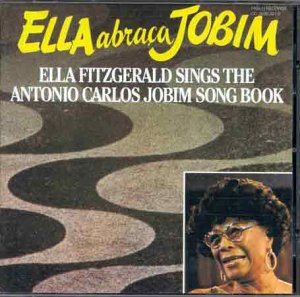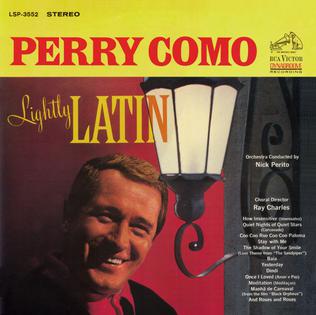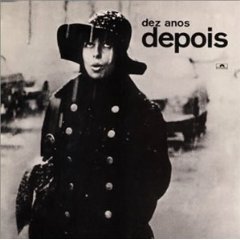
Getz/Gilberto is an album by American saxophonist Stan Getz and Brazilian guitarist João Gilberto, featuring pianist and composer Antônio Carlos Jobim, who also composed many of the tracks. It was released in March 1964 by Verve Records. The album features the vocals of Astrud Gilberto on two tracks, "Garota de Ipanema" and "Corcovado". The artwork was done by artist Olga Albizu. Getz/Gilberto is a jazz and bossa nova album and includes tracks such as "Desafinado", "Corcovado", and "Garota de Ipanema". The last received a Grammy Award for Record of the Year and started Astrud Gilberto's career. "Doralice" and "Para Machucar Meu Coração" strengthened Gilberto's and Jobim's respect for the tradition of pre-bossa nova samba.

Luiz Floriano Bonfá was a Brazilian guitarist and composer. He was best known for the music he composed for the film Black Orpheus.

Ella Abraça Jobim or Ella Fitzgerald Sings the Antonio Carlos Jobim Songbook is a 1981 studio album by Ella Fitzgerald, devoted to the songs of Antônio Carlos Jobim.

The Wonderful World of Antônio Carlos Jobim is the second studio album by Antônio Carlos Jobim with arrangements by Nelson Riddle. It was released in 1965 and was number 57 on the US Albums 1965 year-end chart.

The Sinatra–Jobim Sessions is a 1979 double LP compilation album of American singer Frank Sinatra's work with Antônio Carlos Jobim. The album was published only in Brazil by producer Roberto Quartin, and had never been re-released on vinyl or CD until 2010 when it was re-mastered and released under The Frank Sinatra Collection and became available worldwide.

Terra Brasilis is the 11th album by Antônio Carlos Jobim. It was recorded at the RCA Recording Studios in New York City and released in 1980. The album includes reworkings of old songs as well as new material and placed 42nd on the US Jazz Albums 1980 year-end chart.

Lightly Latin is Perry Como's 13th RCA Victor 12" long-play album.

Bossa Nova is a 2004 Brazilian jazz album by jazz guitarist John Pizzarelli, who is typically known for his swing guitar skills. While not Brazilian, he has always enjoyed the music and therefore wanted to record this album. Some of the selections are penned by Tom Jobim, such as the classic tune "The Girl From Ipanema".
"Dindi" is a song composed by Antônio Carlos Jobim, with lyrics by Aloysio de Oliveira. It is a world-famous bossa nova and jazz standard song. Jobim wrote this piece especially for the Brazilian singer Sylvia Telles. "Dindi" is a reference to a farm named "Dirindi", in Brazil, a place that Jobim and his friend/collaborator Vinicius de Moraes used to visit. In December 1966, Telles recorded this piece with the guitarist Rosinha de Valença.

Tudo Bem! is an album by American jazz guitarist Joe Pass and percussionist Paulinho da Costa that was released in 1978.

Dez Anos Depois is a 1971 double album of bossa nova standards by Brazilian singer Nara Leão.

Sinatra/Jobim: The Complete Reprise Recordings is a 2010 compilation album by Frank Sinatra, consisting of 20 tracks he recorded with the Brazilian musician Antônio Carlos Jobim.
In the late 1960s, Latin jazz, combining rhythms from African and Latin American countries, often played on instruments such as conga, timbale, güiro, and claves, with jazz and classical harmonies played on typical jazz instruments broke through. There are two main varieties: Afro-Cuban jazz was played in the US right after the bebop period, while Brazilian jazz became more popular in the 1960s. Afro-Cuban jazz began as a movement in the mid-1950s as bebop musicians such as Dizzy Gillespie and Billy Taylor started Afro-Cuban bands influenced by such Cuban and Puerto Rican musicians as Xavier Cugat, Tito Puente, and Arturo Sandoval. Brazilian jazz such as bossa nova is derived from samba, with influences from jazz and other 20th-century classical and popular music styles. Bossa is generally moderately paced, with melodies sung in Portuguese or English. The style was pioneered by Brazilians João Gilberto and Antônio Carlos Jobim. The related term jazz-samba describes an adaptation of bossa nova compositions to the jazz idiom by American performers such as Stan Getz and Charlie Byrd.

I Love Brazil! is a 1977 studio album by Sarah Vaughan, accompanied by prominent Brazilian musicians Milton Nascimento, Dori Caymmi, and Antônio Carlos Jobim.
"Bonita" is a bossa nova song composed by Antônio Carlos Jobim, with lyrics in English credited to Gene Lees and Ray Gilbert.
"Samba do Avião", also known as "Song of the Jet", is a Brazilian song composed in 1962 by Antônio Carlos Jobim, who also wrote the original Portuguese lyrics. The English-language lyrics are by Gene Lees.
"Vivo Sonhando" is a bossa nova song from 1962 with words and music by Antônio Carlos Jobim. English lyrics were added later by Gene Lees.

Sinatra & Jobim @ 50 is a latin jazz album by John Pizzarelli, released in 2017 with Concord Jazz. It's a tribute to the 1967 album Francis Albert Sinatra & Antônio Carlos Jobim, released fifty years ago at the time of recording. It's also Pizzarelli's first foray into the genre since his 2004 album Bossa Nova.

Casa is a 2001 studio album by the trio Morelenbaum²/Sakamoto, consisting of cellist Jaques Morelenbaum, vocalist Paula Morelenbaum, and pianist Ryuichi Sakamoto. It is a tribute to Brazilian musician and composer Antônio Carlos Jobim, with most of the songs recorded in his house in Rio de Janeiro, using his grand piano. Casa featured the first recording ever of Jobim's composition entitled "Tema para Ana." The album was released in the United States by Sony Classical.














